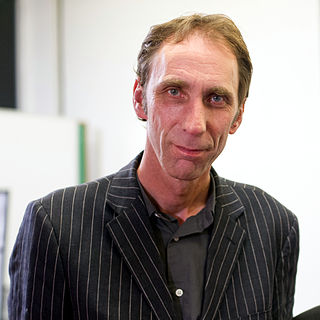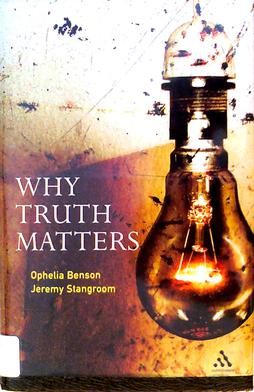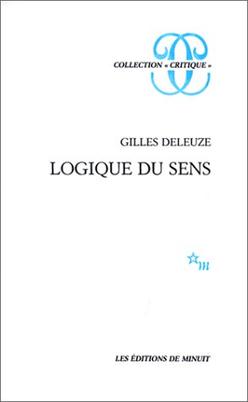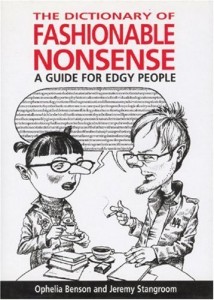
The terms foobar, foo, bar, baz, qux, quux, and others are used as metasyntactic variables and placeholder names in computer programming or computer-related documentation. They have been used to name entities such as variables, functions, and commands whose exact identity is unimportant and serve only to demonstrate a concept. The style guide for Google developer documentation recommends against using them as example project names because they are unclear and can cause confusion.
Gibberish, also known as jibber-jabber or gobbledygook, is speech that is nonsense: ranging across speech sounds that are not actual words, pseudowords, language games and specialized jargon that seems nonsensical to outsiders.
The Sokal affair, also called the Sokal hoax, was a demonstrative scholarly hoax performed by Alan Sokal, a physics professor at New York University and University College London. In 1996, Sokal submitted an article to Social Text, an academic journal of cultural studies. The submission was an experiment to test the journal's intellectual rigor, specifically to investigate whether "a leading North American journal of cultural studies—whose editorial collective includes such luminaries as Fredric Jameson and Andrew Ross—[would] publish an article liberally salted with nonsense if (a) it sounded good and (b) it flattered the editors' ideological preconceptions."

William Woodard Self is an English writer, journalist, political commentator and broadcaster. He has written 11 novels, five collections of shorter fiction, three novellas and nine collections of non-fiction writing. Self is currently Professor of Modern Thought at Brunel University London, where he teaches psychogeography.

A buzzword is a word or phrase, new or already existing, that becomes popular for a period of time. Buzzwords often derive from technical terms yet often have much of the original technical meaning removed through fashionable use, being simply used to impress others. Some buzzwords retain their true technical meaning when used in the correct contexts, for example artificial intelligence. Buzzwords often originate in jargon, acronyms, or neologisms. Examples of overworked business buzzwords include synergy, vertical, dynamic, cyber and strategy.

BookCrossing is defined as the practice of leaving a book in a public place to be picked up and read by others, who may then do likewise. The term is derived from bookcrossing.com, a free online book club which was founded to encourage the practice, aiming to "make the whole world a library."
Technobabble, also called technospeak, is a type of nonsense that consists of buzzwords, esoteric language, or technical jargon. It is common in science fiction.

Fashionable Nonsense: Postmodern Intellectuals' Abuse of Science, first published in French in 1997 as Impostures intellectuelles, is a book by physicists Alan Sokal and Jean Bricmont. As part of the so-called science wars, Sokal and Bricmont criticize postmodernism in academia for the misuse of scientific and mathematical concepts in postmodern writing.
Don Watson is an Australian author, screenwriter, former political adviser, and speechwriter.
In cricket, a duck is a batsman's dismissal with a score of zero. A batsman being dismissed off their first delivery faced is known as a golden duck.

Jeremy Stangroom is a British writer, editor, and website designer. He is an editor and co-founder, with Julian Baggini, of The Philosophers’ Magazine, and has written and edited several philosophy books. He is also co-founder, with Ophelia Benson of the website 'Butterflies and Wheels'.

Ophelia Benson is an American author, editor, blogger, and feminist. Benson is the editor of the website Butterflies and Wheels and a columnist and former associate editor of The Philosophers' Magazine. She is also a columnist for Free Inquiry.

Why Truth Matters is a book by Ophelia Benson and Jeremy Stangroom published by Continuum Books in 2006.

Madonna studies refers to the study of the work and life of American singer-songwriter Madonna using an interdisciplinary approach incorporating cultural studies and media studies. In a general sense, it could refer to any academic studies devoted to her. After Madonna's debut in 1983, the discipline did not take long to start up and the field appeared in the mid-1980s, achieving its peak in the next decade. By this time, educator David Buckingham deemed her presence in academic circles as "a meteoric rise to academic canonisation". The rhetoric academic view of that time, majority in the sense of postmodernism, generally considered her as "the most significant artist of the late twentieth century" according to The Nation, thus she was understood variously and as a vehicle to open up issues. Into the 21st century, Madonna continued to receive academic attention. At the height of its developments, authors of these academic writings were sometimes called "Madonna scholars" or "Madonnologists", and both E. Ann Kaplan and John Fiske were classified as precursors.

The Logic of Sense is a 1969 book by the French philosopher Gilles Deleuze. The English edition was translated by Mark Lester and Charles Stivale, and edited by Constantin V. Boundas.
Jennifer Sheila Uglow is an English biographer, historian, critic and publisher. She was an editorial director of Chatto & Windus. She has written critically acclaimed biographies of Elizabeth Gaskell, William Hogarth, Thomas Bewick, and Edward Lear, and a history and joint biography of the Lunar Society, among others, and has also compiled The Macmillan Dictionary of Women's Biography.

Julian Baggini is a philosopher, journalist and the author of over 20 books about philosophy written for a general audience. He is co-founder of The Philosophers' Magazine and has written for numerous international newspapers and magazines. In addition to writing on the subject of philosophy he has also written books on atheism, secularism and the nature of national identity. He is a patron of Humanists UK, an organization promoting secular humanism.
Criticism of postmodernism is intellectually diverse, reflecting various critical attitudes toward postmodernity, postmodern philosophy, postmodern art, and postmodern architecture. Postmodernism is generally defined by an attitude of skepticism, irony, or rejection toward what it describes as the grand narratives and ideologies associated with modernism, especially those associated with Enlightenment rationality though postmodernism in the arts may have their own definitions. Thus, while common targets of postmodern criticism include universalist ideas of objective reality, morality, truth, human nature, reason, science, language, and social progress, critics of postmodernism often defend such concepts. It is frequently alleged that postmodern scholars promote obscurantism, are hostile to objective truth, and encourage relativism to an extent that is epistemically and ethically crippling. Criticism of more artistic postmodern movements such as postmodern art or literature may include objections to a departure from beauty, lack of coherence or comprehensibility, deviating from clear structure and the consistent use of dark and negative themes.
Rachel Joyce is a British writer. She has written plays for BBC Radio 4, and jointly won the 2007 Tinniswood Award for her radio play To Be a Pilgrim. Her debut novel, The Unlikely Pilgrimage of Harold Fry, was on the longlist for the 2012 Man Booker Prize, and in December 2012 she was awarded the "New Writer of the Year" award by the National Book Awards for this book.











